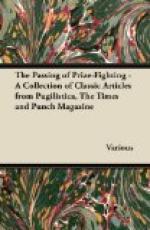I venture to think, however, that my work, based as it is on the most respectable principles, will survive long after my tutors have subsided into a permanent state of death in life. Like SHAKSPEARE and the present Government I am for all time.
It is easy to see how I came to acquire this stability of thought, owing as I do my early training to the kings and queens of England, who are nothing if not stable. They are my acknowledged guardians and to them I turn in all difficulties. Only a year ago they came to my aid in a most awkward predicament. It was my lot to fill up army forms; of what variety I cannot remember save that they were of a jaundicy colour and connected with the men’s demobilisation. On these documents I was expected to enter, besides the usual details as to religion and connubial felicity, the character of each man in a single word. I at once marshalled my wooden royalties before me in chronological order and proceeded to deal with the squadron in rotation.
The first name on my list was that of the disciplinary sergeant-major. It was with a glow of pride that I registered him with WILLIAM I. as “severe.” The designation of Tonks, the Mess waiter (whom we had discovered on the night the bomb fell on the aerodrome making a home and a house of defence in the cookhouse stove), as “heroic” was distinctly happy. It was perhaps unfortunate that the quartermaster-sergeant, an austere man from Renfrew, should have found, on perusing his demobilisation card, that he was to be handed down to posterity as “avaricious.” I was also sorry to find the padre, usually so broad-minded, in a nasty temper about the character given to his batman, who was, he assured me, the only pious man in the squadron and in private life a dissenting minister. “Dissolute” certainly was on the face of things inappropriate, but then it was no fault of mine that the merriest of English monarchs should have appeared at the moment when I was filling up the papers of a minister of religion.
The light that my wooden monarchs throw on history is both interesting and, to a modern, precious. For instance, the designation of the first Angevin king as “patriotic” will surprise many readers of the late Bishop STUBBS. “Patriotic” is a wide term and may be applied to almost anything from after-dinner flag-wagging to successful juggling with Colonial stocks and shares; yet there are few who would have described it as the besetting virtue of HENRY I. But it was; his little block says so.
JOHN, again, was “mean.” I am sorry, for, though in some respects blameworthy, he had many agreeable traits. His views on the honesty of his baronage are most entertaining. He was something of a wit, a good judge of food and wine, and would have made an excellent Fellow of an Oxford college. It is much to be regretted that he was mean.
Poor HENRY VI. is “silly.” This is a hard judgment on the pioneer of the movement against low backs in evening frocks, but doubtless he was silly in other things.




